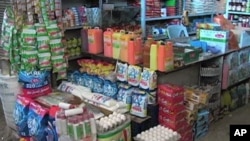This month marks three years since the militant Islamic group Hamas seized control of the Gaza Strip. The event led Israel to impose a blockade on Gaza. Israel's goal was to prevent weapons and other materials that could be used for weapons from entering the Gaza Strip. But it was also to pressure and topple Hamas, which is backed by Iran and whose charter calls for the destruction of the Jewish state. The recent attack by Israeli commandos on a flotilla carrying aid and activists to Gaza has drawn attention to the blockade. Within Israel, questions are being asked about whether it has been effective.
In one of Gaza's markets, there are few signs that a blockade even exists.
There are vegetables, meat, eggs. The basics are all here, as are imported snacks from the United States and Europe. Cigarettes are here too even though they are among the goods that are banned under the Israeli and Egyptian blockade.
Many of the items come from Egypt through smuggling tunnels sanctioned by Hamas. The group's violent takeover of Gaza in 2007 prompted Israel to impose the blockade. The kidnapping of Israeli soldier Gilad Shalit and continued rocket attacks from Gaza have kept Israel from lifting it.
Aside from keeping weapons out of the Gaza Strip, one of Israel's goals in mounting the blockade was to pressure Gazans to topple Hamas. Although Israel says the blockade is essential for its national security, scenes like this have some in Israel questioning whether the closure has worked.
Ashraf al-Koumi's family has owned this market stall for years. He says he has plenty of produce to sell, but few can afford to buy.
"There is food. But there is no work," he said. "We have a high percentage of unemployment. A high number of workers are sitting in their houses, not working. There is no money for a person to buy the daily food for his children."
The loss of jobs and business opportunities has perhaps been more damaging than the restriction on imports, especially for those who - under the blockade - cannot cross into Israel.
Majda Zarouk used to depend on the salary that her husband, an electrician, brought from his job in Israel. That was before the blockade. Now she - and thousands of Gazans - depend on the United Nations - and Hamas - for subsistence.
"UNRWA is helping us," she said. "I remember the first days of the closure when we had no flour, the U.N. gave us flour and food. Thank God, the UN is helping us so much and also Hamas is helping by keeping the tunnels open."
Hamas keeps tight control in the once lawless enclave. Many Gazans say they feel safer from street crime.
Although Israel bans cement from entering, to keep Hamas from building bunkers, streets are being repaired, and some public works projects are proceeding.
This plant turns debris from buildings - many destroyed by Israeli air strikes - into sand and gravel that is then turned into cinder blocks for building.
Gazans appear to be coping. Shalit is still captive, rockets are still falling on Israel, and Hamas remains firmly in power.
Ashraf al-Koumi says for him, Hamas has delivered. "The only one who supports us is this government, our government," he said. "They are letting the products through the tunnels. Everything comes through the tunnels. If there are no tunnels, there is no life."
For Hamas leaders, this is, in some ways, a bigger victory than persuading Israel to lift its restriction on goods entering the territory.

